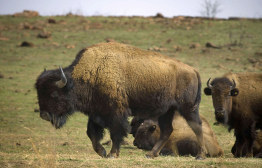Module 1
1. Module 1
1.6. Lesson 2
Module 1: The International System of Units (SI)
Lesson 2: Area
Focus

© LightShaper/shutterstock
People modify the natural world. Some people live in communities with elaborate buildings. Other people create countless products for daily use. The habitat nature has provided for the bison doesn’t need modifications.
The bison is part of the natural landscape of the Canadian prairies. In the early 1800s, the bison’s range was from Mexico to Great Slave Lake in the Northwest Territories. Some estimates say there were as many as 50 million bison, or, on average, about one bison for every eight hectares of grasslands. The bison provided for many of the needs of First Nations and Métis peoples on the Great Plains.
Today you will often see bison as they graze on ranches and reserves. The number of bison that can graze on pasture of a given area depends on plants, rainfall, soil conditions, and climate. For example, suppose a reserve has 2 km2 of pasture available, and Elders estimate that each animal requires 2.5 ha (hectares). How many animals should be in the herd?
Lesson Questions
In this lesson you will explore these questions.
- How is area—the amount of surface—measured in SI?
- What are the common units used when measuring area in SI?
- How are areas in one unit converted to another unit?
Assessment
You will complete the Lesson 2 Assignment Booklet for assessment. Download the Lesson 2 Assignment Booklet and save it in your course folder now. You will receive instructions on how to complete the Assignment Booklet later in the lesson. You will also be prompted to start working on the Unit 1 Project.
Remember to save all activities, including those that are not part of the Assignment, in your course folder.
Required Materials and Equipment
To complete this lesson, you will need the following supplies:
- an old newspaper
- adhesive tape
- scissors
- a metric measuring tape or ruler